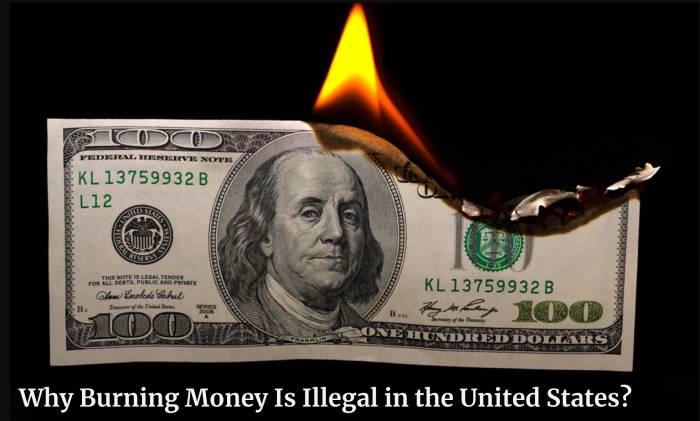Congratulations if you have a pile of money you want to burn-but don’t start it on fire. In the United States, burning money is illegal and punishable by up to ten years in prison.
Additionally, it is illegal to tear a dollar bill or even flatten a penny under the weight of a locomotive.
Defacing and debasing currency is a crime because the federal government mints coins with precious metals. Some criminals filed down or cut off portions of these coins and kept the slivers for themselves while spending the altered money.
However, the chances of being prosecuted under federal laws that make burning money or defacing coins are slim. In the first place, coins now contain very little precious metals. In addition, defacing printed currency is often compared to burning the American flag. As a result, burning money may be protected speech under the U.S. The U.S. Constitution guarantees the freedom of speech in the First Amendment.

Table of Contents
What the Law Says About Burning Money
Federal law makes tearing up or burning money a crime under Title 18, Section 333, which was passed in 1948:
“The person who mutilates, cuts, defaces, disfigures, or perforates, or binds or cements together, or does anything else to a bank bill, draft, note, or other evidence of debt issued by the Federal Reserve Bank, or the Federal Reserve System, with the intent of rendering such bank bills, drafts, notes, or other evidences of debt unfit for reissuing shall be fined under this title or imprisoned for not more than six months, or both..”
What the Law Says About Mutilating Coins
In federal law, mutilating coins is a crime under Title 18, Section 331, which states:
“Fraudulently altering, defacing, mutilating, impairing, diminishing, falsifying, scaling, or lightening any coin coined at the mints of the United States, or any foreign coin in circulation as money in the United States; Those who fraudulently possess, pass, utter, publish, or sell, or attempt to pass, utter, publish, or sell, or bring into the United States, any such coin, knowing it has been altered, defaced, mutilated, impaired, diminished, falsified, scaled, or lightened, shall be fined under this title or imprisoned for not more than five years, or both..”
In Title 18, it is illegal to “debase” coins minted by the government, which means shaving some metal off and reducing their value. It is punishable by fines and up to 10 years in prison.
Prosecutions Are Rare
It’s pretty rare for someone to be arrested and charged with defiling or debasing American currency. The penny press machines at arcades and some seashore attractions comply with the law because they are used to create souvenirs, not to debase or shave metal off coins for profit.
One of the most prominent cases of currency mutilation occurred in 1963: An 18-year-old Marine named Ronald Lee Foster whittled away the edges of pennies and spent the 1 cent coins as dimes.
Foster was sentenced to a year of probation and $20 in fines. In addition, the conviction prevented him from obtaining a gun license. As a result of President Barack Obama’s pardon in 2010, Foster made national headlines.
Why Illegal?
If money is technically your property, why does the government care if you destroy it?
It costs about 5.5 cents to make a $1 bill, and about 14 cents to make a $100 bill, as the Federal Reserve must replace any money taken out of circulation. It may not seem like much per bill, but if everyone burns their money, it adds up
